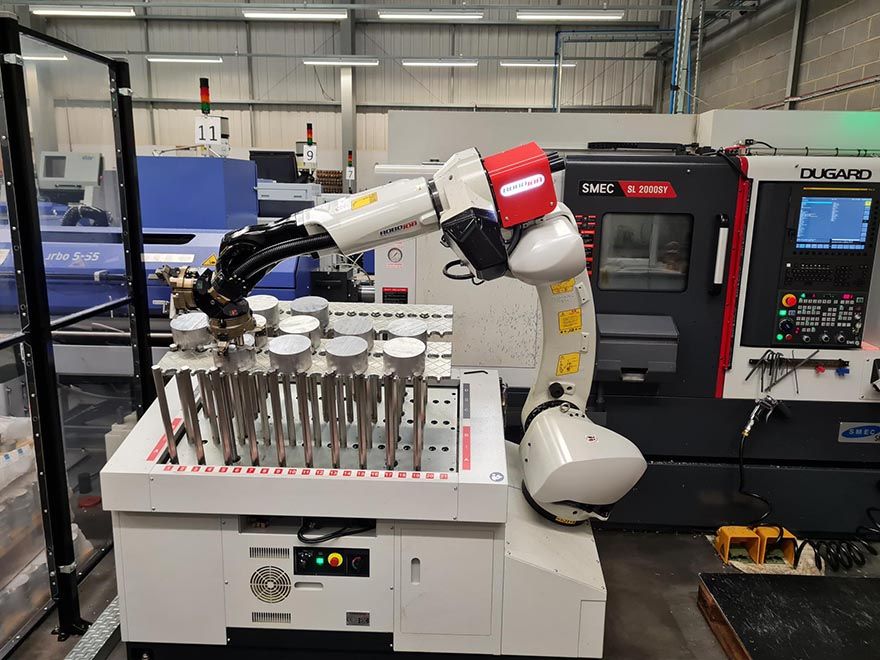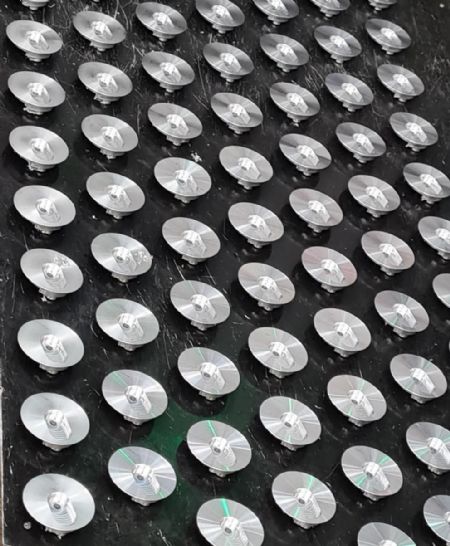 The robot picking a new billet for machining
The robot picking a new billet for machiningFounded back in 2007 with an initial purchase of three sliding-head turning centres, Hoddesdon-based
Empire Manufacturing Ltd is a company that has gone from strength to strength. In 2012, it moved to a larger facility and subsequently added more sliding-head turning centres, with machining centres, measuring equipment and fixed-head turning centres following suit. More recently, the company that has technology from several machine tool vendors has invested in machine tools from Hove-based
Dugard.
In 2022, the company bought a fixed-head SMEC SL2000-BSY turning centre with a bar feed unit, a Robojob robot loader and a Roto-Rack parts catcher. This order was rapidly followed by a Hanwha XD10 sliding-head lathe from Dugard. This has since been followed by yet another Hanwha sliding-head machine.
As an established sliding-head turning shop machining a vast range of products from washers, nuts and bolts, as well as fastenings and bottle tops through to highly complex and intricate components, the Hertfordshire company wanted to increase its capacity for machining small components. To alleviate a bottleneck on an existing 10mm capacity sliding-head turning centre, the sub-contract manufacturer invested in a Hanwha XD10 sliding-head lathe from Dugard.
Managing director Stuart Wade said: “We were getting regular orders for small copper components in quantities from 8,000 to 12,000-off and we needed extra capacity. Our existing machine tool supplier did not have a machine available in the timeframe that we wanted, so we decided to look at the Hanwha machine from Dugard. We quickly discovered that the PCR chip-breaking cycle on the Hanwha machine is far superior to what we already had and this would allow us to run more jobs unmanned and extend our tool life.”
After purchasing the first Hanwha machine from Dugard, Empire Manufacturing quickly realised that it was also better at holding tolerance on long runs of components. One particular example is a regular production run of stainless steel M3 and M4 tight tolerance screws with a weight limit tolerance of +/-0.3mg. Inevitably, there were some scrap components when machining screws on its existing sliding-head machines. However, switching the parts to the Hanwha machine reduced the scrap rate considerably and eradicated the need for constant operator intervention.
OutstandingAs a long-time sliding-head business owner, Mr Wade said: “The ability of the Hanwha machines to hold tolerance is on another level, I have never seen anything like it on a sliding-head machine. There are also a lot of features on the Hanwha machines that stand out from our existing technology. It is for these reasons we opted to buy a second Hanwha machine when the requirement was there. Another reason we opted for a second machine from Dugard was the service; it genuinely is outstanding and better than anything we receive from other machine tool suppliers.”
 Pictured right: a pallet of machined parts from the Dugard SMEC
Pictured right: a pallet of machined parts from the Dugard SMECReflecting on the purchase of the SMEC SL2000-BSY fixed-head turning centre, Mr Wade said: “We had a gantry-loaded turning centre that has performed well down the years. However, it was creating a lot of problems with the unloading of finished parts. Loading billets via the gantry was a simple task but the more complicated our parts became, the more the machine would fail on the unloading operation and in many cases, it would damage parts during unloading.
“The service we received from the existing supplier was indifferent, so we looked at other potential machine tool vendors. We decided to invest in the SMEC with a 2m bar feed unit, a Robojob robot loader and a Roto-Rack parts catcher. The integration of the turning centre with an automated robot loading system and the Roto-Rack part collection system was all handled by Dugard and
Hydrafeed.”
The SMEC SL2000BSY is a single-turret twin-spindle turning centre with an 8in chuck on the main spindle, a 6in chuck on the sub-spindle and a 650mm swing over the bed that provides considerable machining capacity for a small footprint lathe. With 12 tool positions as standard (24 optional) and a BMT55 5,000rpm-driven tool facility with a powerful 3.7/5.5kW motor, the SMEC SL2000BSY provides unrivalled flexibility and productivity in a spacious machine envelope.
As a sub-contract supplier to the aerospace, electronics, automotive, leisure and entertainment sector, precision and quality is a necessity. Mr Wade continued: “Investing in the SMEC SL2000BSY eradicated our issues with unloading parts and we rapidly ramped up to extended periods of unmanned machining. We are manufacturing a range of fuel filter caps and distributor bodies for the automotive and aerospace markets and some parts will vary from 100 to 1,000-off. Other billet-loaded parts could run from 500 to 1,000-off with bar-fed parts stretching to runs of 3,000 to 10,000-off.
“With the previous machine, we had major unloading issues that prevented extended unmanned operation. The reliability of the machine and the support from the supplier were very poor. In some instances, the temperamental nature of the machine would see it shut down with no alarms — only to work perfectly fine the next day. We needed to make a change and we are glad we opted for the SMEC.”
He concluded: “The machine will typically run for around 20hr a day, leaving some time for swarf clearing and insert changes. The aluminium automotive parts on the SMEC at present have a machining cycle of 20min and we can load the Robojob with 40 parts at a time — this gives us over 13hr of unmanned running. Unlike the previous gantry machine, we can simply remove the parts from the Robojob pallets and tell the machine to keep going — this flexibility minimises downtime and gives us incredible productivity rates. We really could not be happier with both the quality of the machines and the impeccable level of service we have received from Dugard.”